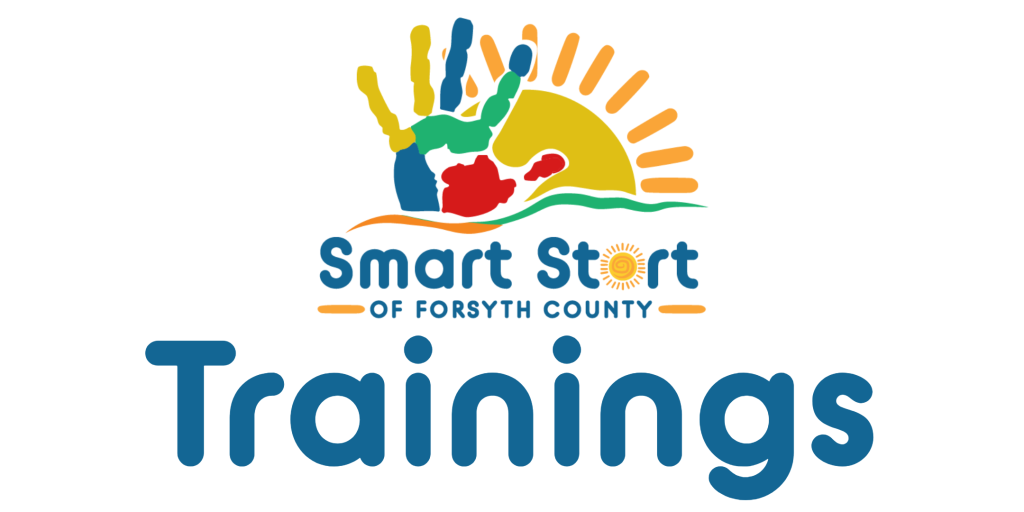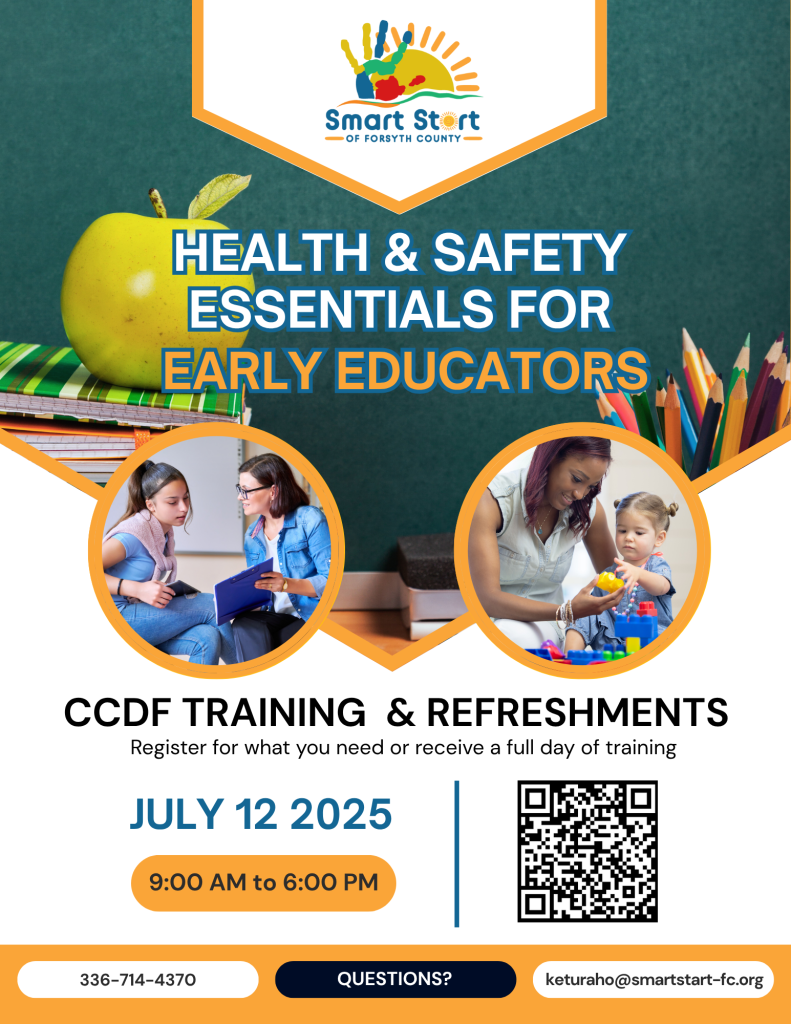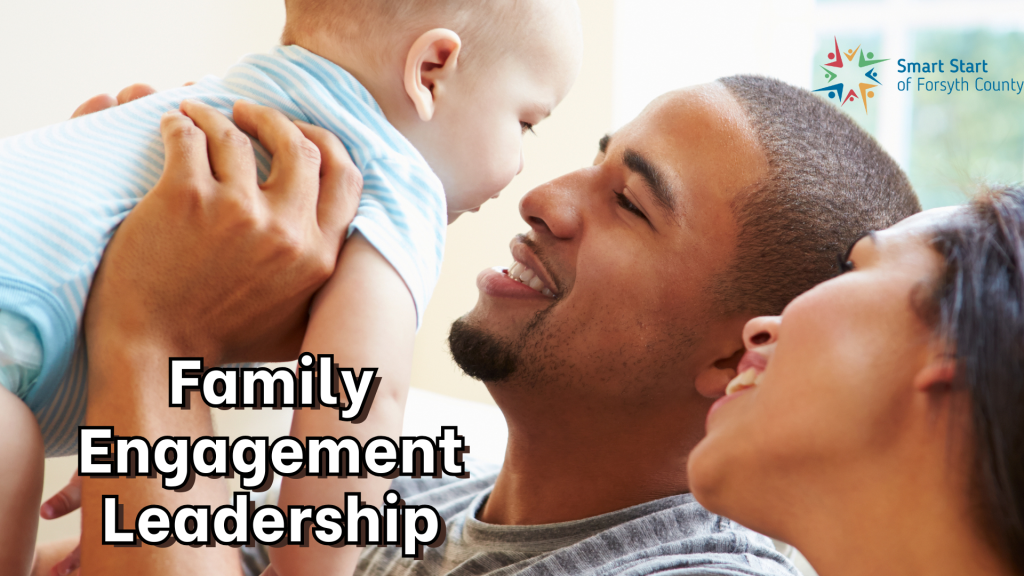Smart Start of Forsyth County Training Expectations
We encourage all participants to make an effort to adhere to the training expectations outlined below:
- Each Participant must pre-register for each training to attend.
- Admittance will not be allowed after the first 10 minutes of class.
- Kindness and respect for one another and the presenter are expected.
- Only participants who have pre-registered for trainings will be issued a Training Certificate of Completion.
- All participants must log into Zoom with their cameras turned on (members of groups on one device must be visible) to receive credit for attendance.
- Cameras must remain on during the training, if you must step away, please post in chat to inform the presenter.
- Please type your name, position/title, and name of childcare facility in the chat box (this will also be utilized as a sign in at the beginning and end of each training).
- Participants’ interaction and participation with the presenter will be greatly appreciated.
- Complete the required pre-survey (with demographic info).*
- Each training participant must complete the training evaluation with the post-questionnaire (this will help SSFC determine the effectiveness of the training and inform decisions for future trainings).*
Upcoming Trainings:
ITS/SIDS
Adults providing care for infants, 12 months or younger, are required to be trained in Sudden Infant Death Syndrome (SIDS) Risk Reduction Practices. The Infant/Toddler Safe Sleep and SIDS Risk Reduction in Child Care (ITS-SIDS) is an approved training that provides an understanding of how to implement safe sleep practices.
Health & Safety Essentials for Early Educators
This comprehensive workshop is designed to meet CCDF training requirements while equipping child care providers with essential knowledge and practical skills to maintain safe, healthy environments for children. Whether you're a new provider or renewing your certification, this interactive session will help you build confidence in managing daily health and safety challenges while ensuring compliance with state regulations.
Emergency Preparedness and Response
Emergency Preparedness and Response (EPR) rules are designed to assist licensed childcare programs to adequately respond to the needs of children and others in the event of disasters and emergencies. The EPR Plan addresses how a childcare center, or a family childcare home will respond to both natural and man-made disasters; to ensure the safety and protection of the children
Playground Safety
This training addresses playground safety hazards, playground supervision, maintenance and general upkeep of the outdoor learning environment, and age and developmentally appropriate playground materials and equipment To register,
Children with Special Health Care Needs
This training, developed by the North Carolina Child Care Health and Safety Resource Center, will include information about children with special health care needs, ADA inclusion requirements, care teams for children with special health care needs, the role of the CCHC, required documentation for children with special health care needs and for handling medical emergencies...
Influencing Policies
This program is to support parents of young children in Forsyth County by providing them with tools for success and a network for support. Parents and caregivers will gain confidence by building from their experiences to enhance the community. Free for families with children 0-5
Positive Interaction
In this training we will define Positive interactions. Discuss why they are important and how we can develop positive interactions in difficult situations.
Room Arrangement
Learn about the dos and don’ts of classroom arrangement, about ITERS and ECERS.
Active Supervision
Training participants will learn what Active Supervision is in the classroom and how to ensure state regulations in the early childhood environment are being met as they relate to Active Supervision. Participants will also learn strategies that will support everyday supervision practices while caring for children in the indoor and outdoor learning environments.
First Aid/CPR
Smart Start of Forsyth County is a proud provider of First Aid, CPR, and AED Training. Be sure to register early; spaces are limited. To receive the certificate, participants must attend the entire training session.
Community Connection Carnival
Bring the whole family to this exciting celebration of everything our community has to offer. Explore local resources and discover amazing small businesses right in your neighborhood, all while enjoying classic carnival games, thrilling activities, and delicious food truck favorites. Whether you're looking to connect with local services, support neighborhood businesses, or simply have a great time with your loved
We’re Moving We’re Learning
Infusing classrooms with physical activity—or at least the option of some movement, at student discretion—isn’t just good for kids’ bodies. It’s also a powerful tool for improving learning, focus, and reducing classroom management issues. Physical activity that amplifies learning can have a powerful effect on retention and engagement—it’s also fun. Learn ways to integrate more...




